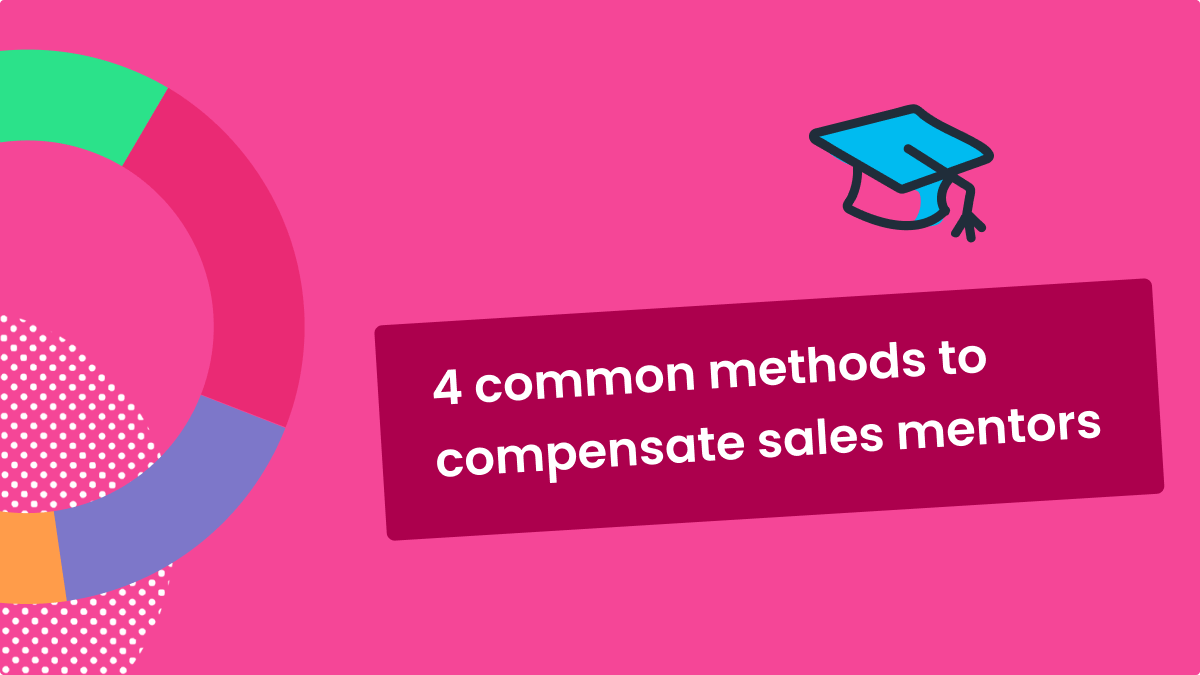Most sales organizations provide internal mentorship programs that involve a senior rep supporting new rep development.
In theory, it’s a great idea.
The mentee learns the ropes from a proven rep within the company and has a go-to, trusted resource for help.
The mentors, on the other hand, get to flex their budding leadership skills and gain extra visibility when their mentees excel. Plus, sales managers and directors benefit as they have another shoulder to lean on to help ramp up new team members.
Sounds like a win-win-win, right?
Not so fast.
Some reps and sales leaders feel the mentor gets the shortest straw since it’s their time that’s getting pulled away.
This raises the question:
Should we compensate sales mentors for their time?
We ran a poll on LinkedIn, and the majority voted hard in favor of compensating mentors.
“As an individual contributor, I’ve always been willing to help without getting paid. But I will give my mentee a lot more attention if I can get something out of it as well,” said Byron Sierra-Mattos.
In Byron’s previous sales roles as a mentor, he’d shadow sales calls with a new rep and offer feedback. Then, as the mentee began closing deals, Byron would earn a percentage of the deals for a designated timeframe.
Alexine Mudawar, CEO of Women in Sales, agreed. For internal sales mentorship programs, creating sales comp with set milestones for mentors could be a nice setup.
However, for mentorship outside of organizations, she disagreed.
“I would never accept compensation externally for mentorship,” Alexine said. “Career coaching I would — but that would be different!”
Jason Conrey, Head of Sales at ElectroNeek, also believes sales mentors should receive additional sales compensation.
“Pay them,” Jason said. “As someone who heads a sales organization, when I leverage mentors for reps it takes a bit of work off of my plate and allows me to focus on other areas, while in parallel, it consumes the bandwidth of the mentor which could be the time they’d apply to further driving their own numbers.”
Factors to consider
If you don’t compensate your mentors but are now thinking about it, here are some points to consider:
What is the ask and time commitment of the mentor? For example, does your mentor sit on calls with the new rep and offer feedback? Or, is the mentee listening in to live demos? The latter requires no additional effort from the mentor as they would have conducted the call regardless.
Compensation structure: What percentage of the mentor’s compensation plan is tied to variable pay? If their pay mix weighs toward variable pay (60:40) versus base pay, and their time is now shared mentoring a new rep, this may call for additional compensation.

How to build a comp plan with sales mentor bonuses
We typically see four methods to compensate sales mentors.
- Commission percentage: This is what Byron had in previous roles. When his mentee closed a deal within a specific length of time, Byron earned a small percentage of commission from the total contract value. The commission percentage model can be easily set up and executed from a commission tracking perspective and could be implemented in your comp plans similar to a SPIF.
- Milestone bonuses: You could also set pre-determined bonus amounts, or milestone bonuses, that the mentor receives as the mentee progresses through larger onboarding accomplishments. Alexine mentioned this structure above.
For example, if the mentee books three demos, the mentor might receive $250. Or, if the mentee closes a deal within the first 60 days, then the mentor receives $500.
Like the commission percentage model, you could set up the milestone bonuses like a SPIF throughout the year as your mentors take on new mentees.
- Shared quota attainment: In situations where the mentor takes an active role in supporting the mentee in closing deals, you could consider retiring quota from the same deal for both the mentor and the mentee. Is this a logistical nightmare? Yes, it’s not easy. That, and your mentor might slack or sandbag a bit knowing they can hit their quota by using the mentee’s book of business to get there.
- Create a senior AE role: The easiest and most effective way to compensate sales mentors is to design a senior AE role with a higher base salary that includes mentoring as part of their job description. This creates a clear career path with differentiated duties between your sale rep levels.
You can use these compensation plan templates to build out base and variable structures appropriate for a senior role.
Create Compensation Plans with confidence
RevOps, sales leaders, and finance teams use our free tool to ensure reps’ on-target earnings and quotas line up with industry standards. Customize plans with accelerators, bonuses, and more, by adjusting 9 variables.
Build a Comp PlanSo, there you have it.
Still thinking your sales mentors should do it for the visibility and experience and not the money?
We leave you with one more point from Jason.
“‘Visibility’ is an absolute joke to most successful AEs,” Jason said. “It’s important but leaders stand out based on other traits and results. My progress from AE to leadership was faster than the majority and my visibility has been high at every stop in my journey but I never did anything to be ‘visible.’”
“Visibility never paid a single bill, but bonus money sure as heck bought me a wake surf boat.”
About QuotaPath
To learn more about QuotaPath’s sales compensation automation and management software, book a time with our team. In the meantime, check out our free resource, Compensation Hub to guide your comp plan design process. This ungated library includes 20 adjustable free comp plan templates to run and test scenarios. Save a plan in Compensation Hub and see it live in QuotaPath for a free 30-day trial.



